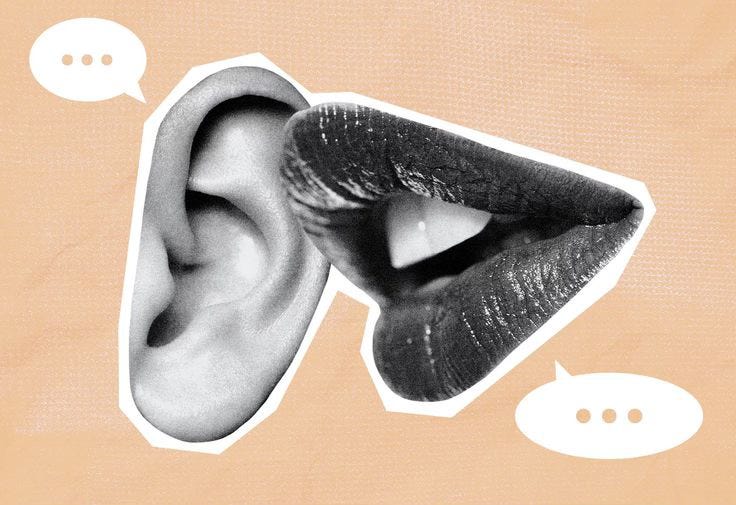What Not to Say When Someone Asks Your STI Status
We’ve all said the wrong thing. Here’s how to do better when talking about STI status, stigma, and disclosure
Before we dive in, I think it’s important to acknowledge the current moment we’re in, as a country (if you’re in the U.S., like me), and on a global scale. Before you read this, I’d like you to pause and take a breath.
Between my dad’s death and the current events, “How are you?” feels like an especially loaded and likely insensitive question. So many people in my life have experienced insurmountable loss in 2025, and it continues to worsen.
While I’m working to return to my regular writing and sexual health content, I don’t want to ignore this moment. This is inherently part of my work. I’m struggling, many of you are struggling, too. I see you, and I’m here with you.
People often ask me how to disclose their STI status to a new partner, or ways to tell someone they have herpes. But rarely am I asked…
“What shouldn't I say if someone asks about my STI status?”

This reality actually isn’t surprising to me. While most people know what sexually transmitted infections (STI) are and can likely name a few, most are unaware of what STI stigma is or that they participate in it.
The unfortunate reality is that much of sex education in the United States doesn’t get it right when it comes to STIs, and actually does more harm than good (for STIs and beyond).
If you find yourself on the receiving end of the “When was your last STI test?” question, here are a few things not to say:
“Don’t worry, I’m clean”
Culturally, many people use the words “clean” and “dirty” when it comes to describing their STI status. What feels like second nature to me is still not common knowledge for many, so let’s address it.
Saying someone is “clean” because they don’t have an STI reinforces that STIs are somehow “bad.” Saying you’re clean implies someone who has an STI (which, might I remind you, affects over half of people in the U.S. during their lifetime), is “dirty.”
These words reinforce the cultural stigma of STIs (especially incurable STIs, like herpes) and further lead to shame about a common experience among sexually active adults.
“I would know if I had something”
That would be great if it were true, but most STI transmissions happen in the absence of symptoms (something I bet your sex ed didn’t teach you). This myth is another big reason so many people don’t get tested—they think that no symptoms means no STIs, and that just isn’t true.
Many sex ed classrooms use scare tactics, like worst-case scenario photos and overly descriptive symptoms, rather than being honest with students about the realities of sex. These fear-based approaches, common in abstinence-only education, fail us.
Even if an STI does present with symptoms, sometimes they are so minor they go unnoticed or are passed off as an ingrown hair, razor burn, or something else. This is why regular testing is so important, because the sooner you find out you have an STI, the sooner you can be treated, and the more informed you and your partners can be.
“I’m on PrEP so I’m good.”
While pre-exposure prophylaxis (PrEP) is highly effective at preventing HIV, it doesn't protect against other STIs like chlamydia, gonorrhea, syphilis, or herpes. This response shows a misunderstanding of what PrEP does and doesn't do, and can give partners a false sense of security about other infections.
“I got tested after my last partner so I’m fine”
I love that you’re getting tested (and you’re talking about it!), but this response leaves us with more questions than answers.
When was your last partner? What were the results? Two weeks ago could be very different from six months ago, especially depending on how many partners you’ve had since then.
Many STIs have “window periods,” which is the time between infection and when tests can accurately detect them. Some STIs need weeks or even months to show up on tests, which means a negative result after exposure may not be representative of your full sexual health story.
Take a Breath
If you’re reading this and thinking, “Oh shit, I’ve definitely said one of these things”— get back to your breath. Most (if not all) of us have been here. Like I said, we don’t realize we participate in STI stigma until we’re confronted with it.
Remember, you were never taught how to talk about STIs (or how NOT to talk about them). The messages we received in our culture and media did little to educate us on the realities of sex, and reinforced all of the wrong messages we received.
You’re not a bad person for not knowing what to say. You’re a better person for being open to learning and wanting to make sure your partners feel safe and seen.
The next time someone asks you about your STI status, or you find yourself asking a new partner, remember to take a breath. Consider what language popped into your head (without judgment). If it’s one of the phrases above, take the time to reframe and adjust. Doing so will help your partners feel more safe and secure, and will ultimately translate into the more “fun” parts of sex.


